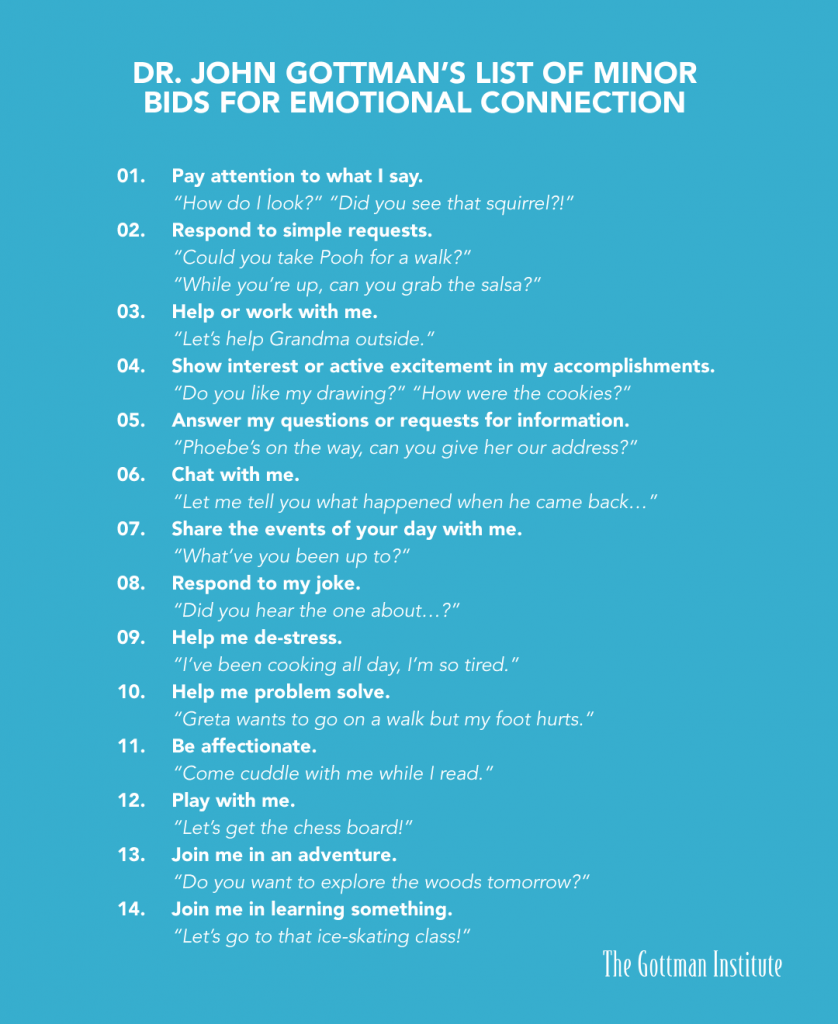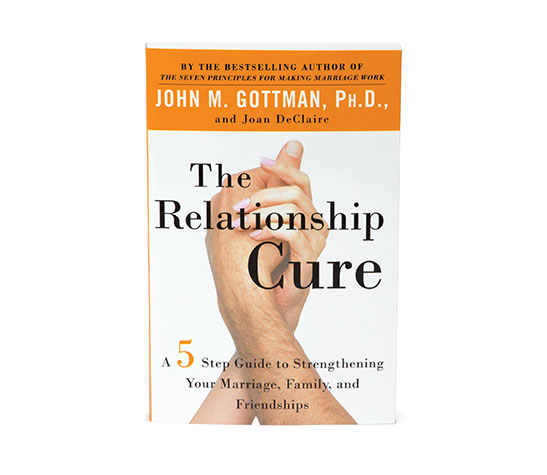by Ryan H. Law
As I was writing this my 4-year old son popped into the room and said, “Hi Daddy. How was your Zoom call?” I reached out for him and told him it was great, and asked him how he knew what Zoom is. We spent the next 5 minutes with me asking him about all kinds of things in the room and if he knew what they were. He had fun answering my questions and I had fun connecting with him.
Pretty soon he was done and he left. He came in looking for a few minutes of connection. There are a lot of ways I could have responded, but spending a few minutes focused on him helped strengthen that relationship.
I enjoy reading parenting and marriage books and research as I’m always trying to improve in those two areas. John Gottman is one of my favorite researchers and I frequently return to several of his books.
One of his main topics is about Bids for Connection, or simply bids. A bid is a request for attention or connection in some way and can be verbal or nonverbal. For example, my son came in with a bid (“Dad – can you please pay attention to me for a few minutes?”)

For another example, if you’re sitting on the couch with someone and you are each reading and one person sighs loudly, that is a bid. You can choose to turn away, turn against, or turn towards the person:
- Ignore the sigh and keep reading (turn away)
- Get angry with them (turn against)
- “Can you keep it down?! I’m trying to read”
- Respond to the bid (turn toward)
- Put down your book and say, “What’s on your mind?”
Gottman can predict with remarkable accuracy which couples will divorce and which ones won’t, and it all has to do with bids. Couples who will stay married “turn toward” 86% of the time, and couples who will divorce only “turn toward” 33% of the time.
So what does this have to do with financial counseling, planning, or coaching?
Plenty.
A bid requires vulnerability. If someone turns against or away from you when you bid, are you going to go back for more? Of course not. You learn from past behavior that it is not a safe space. This is true in business, marriage, parenting, between roommates and every other human interaction.
Even brief encounters generally contain bids. For example, if the stranger in the next seat on the plane says, “That looks like an interesting book,” that is a bid.
Social media is one bid after another:
- Look at what I made for dinner (Please like it and tell me it looks good).
- Look at how smart my kid is (Please like it and confirm they are smart).
- Look at this bathroom remodel (Please like it and tell me we did a good job).
- Check out my new haircut (Please like it and tell me I look good).
You bid, I bid, everyone bids. Including your clients.
Think for a minute about how much vulnerability it takes to talk about money. Most people are stressed about money, most people aren’t doing as well as they think they should be doing, and most people don’t want to talk about money.
It takes incredible vulnerability to say, “I can’t figure this out and I need help.” They are bidding for your approval and help.
A bid is a request for connection. The person is silently (or sometimes not silently) asking for understanding, acceptance, and compassion. Gottman says that turning towards bids forms the basis of trust (and we know that trust is the basis of a successful relationship).
Turning towards a client’s bids says to the client:
- I’m interested in what you are saying
- I hear you
- I understand you
- I’m on your side
- I’d like to help
- I accept you
What types of bids do clients make? Consider some of the following:

- Making an appointment
- Shaking your hand
- Learning towards you in an appointment
- Getting upset (“My portfolio went down 10% this month!”)
- Apologizing (“I’m sorry – I didn’t call an estate lawyer like I said I would.”)
- Completing action steps they agreed to
There are many additional actions that could be listed. You can find “bids” many times throughout an appointment.
How do you “turn towards” your client when they make a bid? You can turn towards when you:
- Show compassion and empathy
- Truly listen
- Are genuinely interested in what they are saying
- Validate them
- Reflect on the emotion
- Listen without judging
We’ll talk about all of these topics over the coming months on my blog. For now, though, just start to notice those bids and think about how you can turn towards them whenever possible.
ACTION STEPS:
- Read through this list of bids from the Gottman Institute to better understand bids and the underlying question:

- To learn more about bids read Gottman’s book The Relationship Cure: A 5 Step Guide to Strengthening Your Marriage, Family, and Friendships (AFF)

- Watch for a bid from someone close to you. It could be a text, a question, a comment, a touch – watch for it and deliberately turn towards then.
As always, if you enjoyed this content and found it useful, please forward it to someone else who would enjoy it.

REFERENCES AND RESOURCES
The Relationship Cure: A 5 Step Guide to Strengthening Your Marriage, Family, and Friendships (AFF)
All images except Gottman book and list of bids are licensed by Ingram Image – Stock Photo Secrets (AFF)


[…] requires several other important skills: active listening, empathy, clarification, connecting, and a genuine interest in other […]